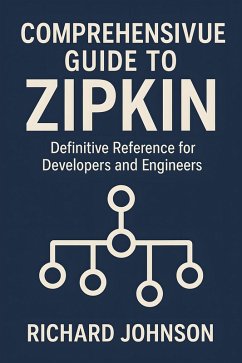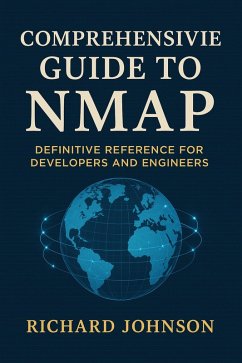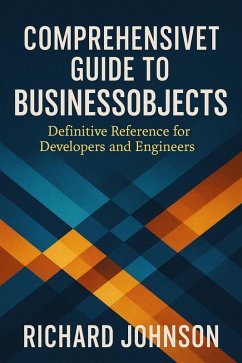
Comprehensive Guide to EasyMock (eBook, ePUB)
Definitive Reference for Developers and Engineers

PAYBACK Punkte
0 °P sammeln!
"Comprehensive Guide to EasyMock" The "Comprehensive Guide to EasyMock" provides an in-depth exploration of advanced mocking principles for Java developers committed to achieving robust, maintainable, and scalable unit testing. Traversing foundational theories of test doubles and isolation, the book offers clear distinctions between behavior verification and state-based testing, while positioning EasyMock within the modern Java testing ecosystem through thoughtful historical and architectural insights. With meticulous detail, it addresses determinism, reproducibility, and the architectural pat...
"Comprehensive Guide to EasyMock"
The "Comprehensive Guide to EasyMock" provides an in-depth exploration of advanced mocking principles for Java developers committed to achieving robust, maintainable, and scalable unit testing. Traversing foundational theories of test doubles and isolation, the book offers clear distinctions between behavior verification and state-based testing, while positioning EasyMock within the modern Java testing ecosystem through thoughtful historical and architectural insights. With meticulous detail, it addresses determinism, reproducibility, and the architectural patterns-such as dependency injection and inversion of control-that underpin resilient and adaptable test frameworks.
Moving beyond foundational concepts, the guide delivers practical, expert strategies for configuring sophisticated test environments, including integration with leading JVM build systems, modular projects, and popular IDEs. Readers benefit from discussions on continuous integration, isolated environments, and advanced classpath management, all crucial for scaling test suites in enterprise-grade software. Each chapter delivers nuanced techniques for constructing mocks, managing their lifecycles, and orchestrating precise behavioral expectations-such as dynamic stubbing, complex call sequencing, argument matching, and deep collaborator handling-ensuring fine-grained control and verification across diverse Java paradigms, including reactive and asynchronous flows.
Culminating with patterns for scaling, optimizing, and securing large test suites, this guide equips teams with methodologies to manage flakiness, test coverage, performance, and maintainability amidst growing project complexity. Coverage extends to customization and extension of EasyMock with custom argument matchers, factories, and integrations with other tools such as PowerMock. Finally, forward-looking chapters address emerging practices such as AI-driven testing, distributed validation in the cloud, observability integration, and sustainable test suite evolution-making the "Comprehensive Guide to EasyMock" an indispensable manual for experienced engineers and teams aiming to future-proof their Java testing strategy.
The "Comprehensive Guide to EasyMock" provides an in-depth exploration of advanced mocking principles for Java developers committed to achieving robust, maintainable, and scalable unit testing. Traversing foundational theories of test doubles and isolation, the book offers clear distinctions between behavior verification and state-based testing, while positioning EasyMock within the modern Java testing ecosystem through thoughtful historical and architectural insights. With meticulous detail, it addresses determinism, reproducibility, and the architectural patterns-such as dependency injection and inversion of control-that underpin resilient and adaptable test frameworks.
Moving beyond foundational concepts, the guide delivers practical, expert strategies for configuring sophisticated test environments, including integration with leading JVM build systems, modular projects, and popular IDEs. Readers benefit from discussions on continuous integration, isolated environments, and advanced classpath management, all crucial for scaling test suites in enterprise-grade software. Each chapter delivers nuanced techniques for constructing mocks, managing their lifecycles, and orchestrating precise behavioral expectations-such as dynamic stubbing, complex call sequencing, argument matching, and deep collaborator handling-ensuring fine-grained control and verification across diverse Java paradigms, including reactive and asynchronous flows.
Culminating with patterns for scaling, optimizing, and securing large test suites, this guide equips teams with methodologies to manage flakiness, test coverage, performance, and maintainability amidst growing project complexity. Coverage extends to customization and extension of EasyMock with custom argument matchers, factories, and integrations with other tools such as PowerMock. Finally, forward-looking chapters address emerging practices such as AI-driven testing, distributed validation in the cloud, observability integration, and sustainable test suite evolution-making the "Comprehensive Guide to EasyMock" an indispensable manual for experienced engineers and teams aiming to future-proof their Java testing strategy.
Dieser Download kann aus rechtlichen Gründen nur mit Rechnungsadresse in A, B, BG, CY, CZ, D, DK, EW, E, FIN, F, GR, H, IRL, I, LT, L, LR, M, NL, PL, P, R, S, SLO, SK ausgeliefert werden.













